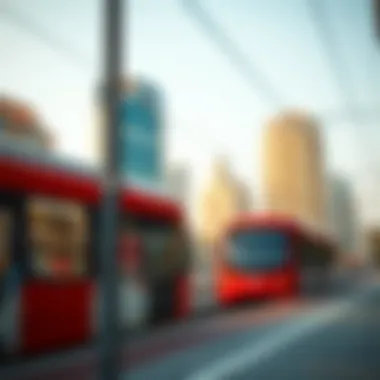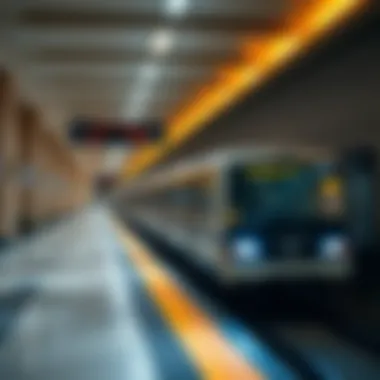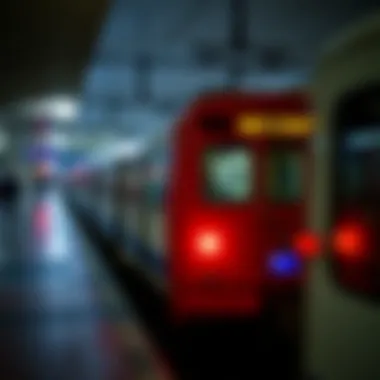Dubai Metro Sunday Start Times: Public Transit Insights


Intro
Dubai, a city characterized by its rapid growth and urban development, relies heavily on its public transit systems. Among these, the Dubai Metro stands out as a lifeline for commuters, providing a seamless link between various points in the city. Investigating the starting times of this essential service reveals not just the mechanics of transit but its deeper implications for residents and visitors alike. This article will unpack the metro's Sunday starting hours and underscore its broader significance.
Public transport is more than just a convenience; it shapes the daily lives of many, influences economic activity, and enhances urban mobility. With the influx of tourists and a diverse population, understanding the operational nuances of the Dubai Metro, especially on Sundays, can empower individuals to navigate the city more effectively. As we dive into this analysis, we will also explore how the metro schedules interact with the rhythms of life in Dubai, revealing insights about societal norms and economic patterns that are often overlooked.
With myriad options for travel and varying schedules, this guide serves to illuminate how one can plan their journeys to make the best use of the metro system. Whether for work, leisure, or tourism, knowing when the trains begin their operations can make all the difference. As we delve deeper into this topic, we will highlight key points, from the significance of timing to the ways it affects commuting habits.
Market Insights
The interplay between transport systems and real estate trends cannot be understated. A well-functioning metro system invariably shapes property dynamics in urban environments. For investors and homeowners, understanding these links can unlock value and opportunities.
Current Property Trends
As Dubai continues to grow, areas near metro stations often see a surge in property interest. The accessibility provided by the metro has made certain neighborhoods prime spots for both residential and commercial real estate. For instance, areas like Downtown Dubai and Dubai Marina have become increasingly desirable due to their connectivity via the metro lines. This trend suggests that properties within walking distance of a metro station tend to retain higher valuations.
Investment Opportunities
Investing in properties close to metro stations might be a strategic move for stakeholders. For example, upcoming developments near the new metro line extensions are likely to attract considerable interest. Investors should keep an eye on areas such as Al Jaddaf and the new stations around Dubai South, as forecasts hint at potential value appreciation.
Practical Tips
The convenience of the Dubai Metro can enhance commuting experiences, yet effective navigation requires understanding practical elements.
Guide to Public Transport
- Familiarize with Schedule: Always check the latest operating hours on the RTA website, especially for Sundays when times can vary.
- Use the RTA App: Downloading this app can provide real-time updates on train timings and notifications about service changes.
- Plan Ahead: Knowing your route in advance can save significant time. Look into any transfer stations you may need to navigate.
- Smarter Ticketing: Consider purchasing a NOL card for hassle-free access to metros and buses.
Renting vs. Buying: What You Need to Know
- Renting properties near metro stations often offers flexibility, particularly for newcomers or transient professionals.
- Buying in these areas not only provides potential rental income but could also result in significant appreciation over time.
Understanding the metro schedule, especially on Sundays, is about more than just catching a train. It ties into the larger context of urban living, economic factors, and investment decisions. As Dubai evolves, so too does its transport infrastructure, shaping the lives of all who call this vibrant city home.
"Public transport is a cornerstone of urban development. In Dubai, the metro is a reflection of an advanced city managing growth effectively."
For current updates and further exploration of the Dubai Metro, visit RTA Dubai.
For exploring property trends, check resources like Property Finder. This will allow you to gather insights to make informed decisions.
Understanding the Dubai Metro System
Understanding the Dubai Metro system is crucial for grasping how this extensive transit network shapes urban life in the city. It’s more than just transportation; it’s the backbone of daily movement for residents and visitors alike. The Metro helps to alleviate traffic congestion, reduce carbon emissions, and promote a more sustainable urban ecosystem.
The system operates at the intersection of efficiency and sophistication, accommodating millions of people every year. Its impact trickles down to various sectors, from real estate values near stations to overall economic stimulation through improved accessibility.
Overview of the Metro Network
The Dubai Metro network is one of the most advanced in the world. It consists of multiple lines that blanket the city and its suburbs, stretching across key residential and commercial areas. There are two primary lines—Red and Green—each serving distinctive routes and communities.


- Red Line: Runs from Rashidiya to UAE Exchange, linking many of the city’s major attractions, including the Dubai Mall and the Mall of the Emirates.
- Green Line: Connects the Dubai Creek area with Al Qusais, providing crucial access to various neighborhoods.
The Metro stations are designed with modern architecture, featuring seamless connectivity with buses and taxis. This thoughtful integration facilitates easy transfers, ensuring that users can travel through the city without unnecessary hassles.
Importance of Public Transportation
Public transportation is essential for urban life, with the Dubai Metro serving as a prime example of its benefits. Here are a few key points to consider:
- Economic Connectivity: Efficient public transit connects workers to jobs, thereby enhancing productivity and economic growth.
- Environmental Impact: Reducing reliance on cars leads to lower emissions and improved air quality.
- Social Inclusion: It provides transportation for all classes, promoting equality in access to jobs and services.
In Dubai, the Metro is not just about getting from point A to B. It embodies a sustainable vision for a rapidly growing city, ensuring that development keeps pace with population growth without compromising quality of life.
"Public transport, such as the Dubai Metro, is the heartbeat of a city, connecting diverse communities and driving economic growth."
Understanding these aspects of the Dubai Metro system lays the groundwork for comprehending its role on Sundays and beyond, as this exploration reveals broader implications for commuting patterns and urban lifestyle.
The Role of Sunday in Commuting Patterns
The significance of Sunday in the context of commuting in Dubai cannot be overstated. This day acts as a bridge between the busyness of the week and the relaxing start of the new week. For many, Sunday is not merely a day to sleep in, but a crucial part of their weekly transportation routine. Therefore, understanding the role of Sunday in commuting patterns sheds light on the broader implications for residents and visitors alike.
One of the key aspects of Sunday commuting is that it parallels a unique blend of leisure and business. While weekends may typically signal a halt in workplace activity, this day has gradually become a time for businesses to churn. Shoppers take to the malls, families explore parks, and some individuals even engage in preparatory activities for the week ahead. These varied pursuits demand a comprehensive public transport framework that accommodates the ebb and flow of commuter traffic.
Comparison with Weekday Operations
Examining the differences between Sunday and weekday metro operations reveals some striking contrasts. During weekdays, the metro system typically operates at peak capacity, catering to thousands of workers making their daily trips to offices and schools. In comparison, Sundays offer a more relaxed atmosphere where commuter numbers may not be as high but are still significant. This lowers the intensity of operations but maintains a steady rhythm.
- Frequency and Timing: On weekdays, the first train might depart as early as 5 AM, while on Sundays, the starting times are often pushed back. The gradual scaling back of train frequency demonstrates an awareness of changing demand patterns.
- Passenger Dynamics: The passengers on a Sunday are often varied. Families with children, shoppers, and tourists may replace the routine office-goers, showcasing a distinct demographic shift.
- Load Balancing: Unlike Monday to Friday when commuter loads increase sharply during peak hours, Sundays offer a more even distribution of travelers throughout the day.
This comparison underscores how metro operations in Dubai adapt to the unique demands posed by Sunday commuting, directly influencing public transport planning and deployment.
Cultural Significance of Sundays in Dubai
Sunday in Dubai isn't just another day of the week. It's layered with cultural nuances and traditions that further influence commuting patterns. Traditionally, in various cultures, Sundays are considered days for family gatherings, spiritual observance, or simply taking a breather before the workweek descends on them again.
- Family Time: Many residents regard Sunday as an opportunity to bond with family or engage in recreational activities. This cultural value encourages families to use the metro to visit parks, malls, or cafes, hence impacting transit flows.
- Religious Activities: For a significant portion of Dubai's population, attending prayers or community gatherings on Sunday holds high importance. These rituals require scheduling adjustments, prompting many to plan their day around metro timings.
- Shopping: Malls in Dubai often host weekend promotions or activities aimed at drawing families and tourists, filling metro cars with eager shoppers.
The cultural complexity surrounding Sundays is not just about leisure but is deeply intertwined with daily schedules and transport demands.
"Understanding the cultural dynamics at play on Sundays gives way to a nuanced perspective on public transit planning in a global city like Dubai."
In summary, Sundays in Dubai demand a thoughtful approach to metro scheduling and operations as they encapsulate the intersection of leisure, culture, and necessary commutation. This important day requires public transport systems to adapt to varied needs, reflecting broader social behaviors.
Metro Starting Times: A Detailed View
Understanding the starting times of the Dubai Metro on Sundays is not merely about knowing when the trains commence their journeys. It's tied to the broader socio-economic patterns of the city and how public transport serves as a backbone for daily commutes. For many residents, the first train can determine whether they make it to their appointments on time or get a head start on a leisurely Sunday. Here, we will unravel the specifics of Sunday’s metro schedule and its significance in the lives of commuters.
First Train Departure on Sundays
On Sundays, the Dubai Metro begins its operation with the first train departing at 8:00 AM. This slightly delayed start compared to weekdays offers a unique rhythm to the metro's operational cadence. The lateness may seem a hindrance to the early risers, but it reflects cultural considerations. Sundays are often viewed as a more relaxed day of the week, following the Friday and Saturday break, during which many residents value a slow start.
Now, why is this important? The Sunday schedule affects those looking to kick off their week smoothly. Whether it’s a morning brunch with friends or an early visit to the market, understanding the starting time can significantly help in planning ahead. Commuters are advised to consider the first train schedules while planning their outings, ensuring they maximize their time efficiently.


Variations in Schedule by Line
Not all metro lines follow a cookie-cutter timetable. The Dubai Metro network is segmented into two major lines: the Red Line and the Green Line, each catering to different areas of the city and communities.
- Red Line: First trains start at 8:00 AM
- Green Line: First trains also depart at 8:00 AM
Despite the similar starting times, these lines serve different populations and destinations. For example, the Red Line runs through key business districts which may see varied passenger flow compared to the residential feel of the Green Line. Each line's schedule intricacies offer a glimpse into the economics of public transit; demand shapes operational times.
Factors Influencing Metro Timing
The timing of metro departures on Sundays doesn’t exist in a vacuum. Several factors come into play, influencing how and when trains commence service:
- Cultural Practices: As mentioned, Sundays are viewed differently in various communities. Their role as a day to ease back into the week sways operational start times.
- Public Demand: City planners assess ridership data to adjust train schedules according to passenger needs. If a demand arises for early trains during certain events or seasons, adjustments may follow.
- Maintenance Schedules: Routine maintenance can also dictate starting times. On Sundays, when foot traffic is lower, maintenance teams might schedule checks that can affect the timing.
In summary, the operational framework of Dubai’s metro system on Sundays tells a story beyond just numbers. It highlights how public transit aligns with the rhythms of daily life, compromises with cultural nuances, and adapts to the needs of its users. Having a solid grasp on these elements can empower commuters to make savvy travel plans, ensuring they navigate Dubai’s bustling urban landscape with ease.
Impact of Metro Operations on Daily Life
The operations of the Dubai Metro profoundly influence the daily life of its users, playing a critical role in shaping the commuting landscape of the city. Its efficiency, accessibility, and coverage make it a preferred option for diverse groups, from tourists exploring the Emirate to locals engaged in work or leisure activities. Analyzing how the metro affects daily commuting patterns sheds light on several important facets that contribute to the overall quality of life in Dubai.
Commuter Experience on Sundays
When it comes to Sundays, the commuter experience presents a unique set of dynamics. For many, this day marks the start of the workweek, making it a prime time for individuals to schedule their travels. The Dubai Metro provides a reliable means of transportation, with trains operating at regular intervals. The first train's departure, generally at 8:00 AM on Sundays, allows commuters the flexibility to arrive at their destinations on time.
Furthermore, Sundays can be less crowded compared to weekdays, offering a more comfortable ride. Riders often appreciate the chance to settle into their seats, unhurried by the bustling crowds typical of peak times.
Statistically, many commuters prefer the metro due to its efficiency. It averages a travel speed of about 43 km/h, which, when compared to road traffic can be a real time-saver.
"For commuters, the Dubai Metro isn’t just a transport method; it's a lifeline feeding their work and social schedules."
Essentially, the metro becomes an integral part of their weekly routines. This transportation convenience allows passengers to reclaim their time and minimize stress, enabling a smoother transition into the workweek.
Economic Implications of Timely Transport
The economic consequences of timely transport cannot be understated. The Dubai Metro not only serves its commuters but also has ripple effects throughout the city's economy. When reliable transport is available, it fosters greater productivity. For example, when employees arrive on time, businesses can operate more efficiently, ultimately enhancing their profitability.
Moreover, the metro fosters tourism—a sector significantly contributing to Dubai's GDP. With convenient access to major attractions like the Burj Khalifa and The Dubai Mall, tourists can navigate the city with ease. A robust transport framework encourages visitors to remain longer, spend more, and recommend their experiences to others, further boosting hotel bookings and local dining.
Additionally, the metro encourages sustainable living. By reducing reliance on cars, there’s less congestion and lower carbon emissions. This greener approach to urban transport not only benefits the environment but also aligns with Dubai’s broader economic strategies aimed at sustainability.
In summary, the impact of the Dubai Metro on daily life combines convenience and economic vitality. From commuter comfort on Sundays to benefiting the economy through timely transport, it reflects an essential thread in the urban fabric of this vibrant city. This seamless integration of reliable public transit into the routine offers immense benefits to all stakeholders involved.
Future Considerations for Dubai Metro
As Dubai continues to expand and evolve, the future of its Metro system is a significant topic worth discussing. Planning ahead can greatly enhance the efficiency and reliability of public transportation, making it a critical component for investors, homeowners, and commuters alike. How the Metro adapts to changing needs can determine its viability as a mode of urban transport.
Potential Adjustments in Operation Hours
One of the primary considerations is the adjustments in operation hours. Sundays, traditionally viewed as rest days in Dubai, often see a different routine, especially during events or festivals. With other countries adapting their public transportation schedules to better serve their citizens, Dubai may find it beneficial to explore this avenue.


For instance, during the recent Eid celebrations, peak travel times saw an increase as residents flocked to shopping malls and parks. An adjusted schedule that starts earlier on certain occasions or extends into the early hours could provide ease of access. This flexibility would enhance rider convenience, ensuring that public transport aligns seamlessly with social and cultural calendars.
"Public transport needs to be in sync with the city's rhythm to keep pace with modern demands."
Implementation of such changes could involve:
- Time-Mapped Scheduling Changes: Tailoring train departure times to match high-demand periods.
- Feedback Systems: Gathering data from commuters on their travel preferences during special occasions.
- Promotional Campaigns: Encouraging increased usage during adjusted hours through discount fares or special trips.
Integration with Other Transportation Modes
A future where the Metro system integrates with other modes of transport is also crucial. With the city boasting a diverse range of transport options—like buses, taxis, and ride-sharing apps—ensuring they work cohesively is essential. This integration will not only streamline the travel experience but will also contribute to reducing traffic congestion.
- Unified Ticketing Systems: Imagine a scenario where a single ticket could work across buses, taxis, and the Metro. This would simplify the payment process and encourage more people to opt for public transport.
- Coordinated Timetables: Aligning departure and arrival schedules among different transport services can eliminate wait times and create a more connected network.
- Last-Mile Connectivity: Addressing the final leg of a journey is vital. Bicycles, scooters, and ride-sharing services should be strategically placed near Metro stations to facilitate easier transfers.
Establishing a robust transport ecosystem will not only aid in daily commuting but also make Dubai an appealing choice for potential investors, who are typically keen on thriving transport infrastructure.
By looking into these aspects, the Dubai Metro can evolve to meet the demands of a growing population, ensuring it remains a pivotal element in the urban landscape. Keeping a finger on the pulse of both residential needs and tourism trends will be crucial in shaping its future.
Practical Tips for Using the Metro
Public transportation in Dubai is not just a method of moving from one place to another; it's a vital thread woven into the city’s fabric. Understanding how to navigate the Dubai Metro system can greatly enhance your commuting experience. This section arms readers with practical tips, allowing newcomers and seasoned commuters alike to leverage the metro effectively. The overall goal is to make travel smoother, more efficient, and less stressful.
Navigating Metro Stations
Navigating through the sprawling network of metro stations in Dubai can seem daunting, but with a bit of insight, it can be as easy as pie. First, familiarize yourself with the basic layout and color-coded lines of the Metro.
- Know Your Stations: Before embarking on your journey, look up the names and locations of the stations you need. You can find useful maps online or at the metro stations themselves. Highlight major transfer stations, like Union and Burjuman, which connect various lines.
- Signage: Pay attention to the signs. Most of them are in both English and Arabic, and directions are generally clear. Look out for directional symbols indicating where to go for ticketing, platforms, and exits.
- Timing: Sundays can be a bit trickier as the crowd varies significantly throughout the day. Early morning rush hours may feel like a bee swarm, especially around popular stations like Mall of the Emirates or Deira City Centre. Aim to travel outside peak hours whenever possible to enjoy a more relaxed ride.
- Accessibility: If you're traveling with kids or baggage, use elevators and escalators when available. They save time and reduce hassle, especially when you have little ones or heavy items with you. Also, don’t hesitate to ask station staff for assistance if you need help – they’re there to guide you.
Smart Ticketing Options
Diving deeper into the nuts and bolts of how to pay for your journey reveals a streamlined ticketing system that simplifies the entire process. Here’s what you need to know about smart ticketing options that the Dubai Metro provides:
- Nol Card: This is central to getting around. The Nol Card isn’t just an ordinary transport card; it’s a tap-and-go marvel. You can purchase it from vending machines or customer service counters at stations. Remember, there's three types of Nol cards available – red, silver, and gold. Consider your travel frequency when choosing.
- Recharge Easily: Recharging your Nol Card is a breeze. You can do this at machines across all metro stations, as well as major bus stops. Just think of it as putting more fuel in your tank when you're running low. Keep an eye on your balance; an empty card can throw a wrench in your travel plans.
- Mobile Apps: Check out RTA’s official app for added convenience. It’s almost like having a metro guide in your pocket. Not only can you recharge your Nol card, but you can also check train schedules, plan routes, and get real-time updates.
- Cost Efficiency: Using the Nol Card can indeed save you some dirhams compared to purchasing single journey tickets. Plus, the ability to transfer between different metro lines without extra charges makes it more economical for frequent travelers.
In summary, getting the most out of the Dubai Metro necessitates a low-key understanding of the stations and strategic ticketing. These simple yet effective strategies can ensure that your journey through the city is nothing short of seamless. For those interested in more detailed information about Dubai’s transportation system, visit RTA.
The End
In our exploration of the Dubai Metro's Sunday operations, the significance of metro timing cannot be overstated. On a global scale, timely public transportation is a major backbone of any bustling metropolis, and Dubai is no exception. Understanding when the metro starts on Sundays enables residents and visitors to navigate their weekend plans with confidence. This knowledge not only alleviates stress but also ensures efficient travel across different parts of the city.
Summarizing the Importance of Metro Timing
The starting times of the metro hold substantial weight in shaping the daily activities of commuters. For many, Sunday is a transitional day, marking the end of the weekend and the return to the workweek. Knowing that the metro service begins punctually can serve as a reliable framework for planning outings, errands, or business meetings. Whether it’s attending a social event or simply visiting family, having access to precise metro timing means individuals can make informed decisions, reducing potential delays and optimizing their schedules. Furthermore, this reliability in public transport can boost Dubai's attractiveness as a destination for tourists looking to explore without the hassle of finding alternate routes.
The Future of Public Transport in Dubai
Looking ahead, the landscape of public transport in Dubai is on the precipice of change. Urban development is constantly evolving, and with that comes the necessity for public transport to adapt too. There’s much discussion around how future technology can enhance the efficiency and convenience of metro services.
Potential improvements may include deeper integration with mobile technology and real-time updates, allowing commuters to make decisions based on current conditions. Moreover, as Dubai continues to expand, discussions about extending metro lines or introducing new services are underway. This progressive mindset is vital not just for economic vitality but also for fostering a use-case of sustainable urban living. As such, keeping a close eye on these developments is essential for those invested in Dubai's future.
"The metro system stands as a hallmark of Dubai’s commitment to modern public transportation, paving the way towards a smarter, more connected city."
Sources:
- Dubai Roads and Transport Authority
- Wikipedia - Dubai Metro
- Britannica - Transportation in the United Arab Emirates
- Reddit - Dubai Transportation Discussions
Understanding the metro’s starting time on Sunday envelopes a larger conversation concerning the efficacy of public transport within Dubai’s urban fabric. As the city evolves, so will the systems that connect its people, placing the metro at the heart of this journey.















